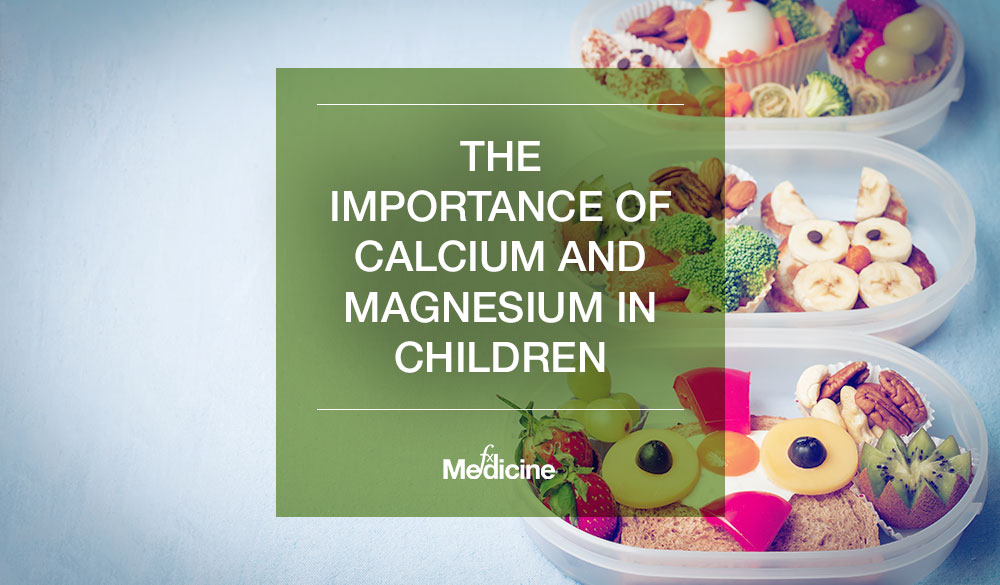Belinda Fay ● 2 min read
Many Australian children are not meeting the current recommendations for various nutrients fundamental for their growth and development.
Poor eating habits such as eating predominantly processed foods and skipping meals are an important contributor of inadequate nutrient intake in children. In particular, the human body does not synthesise minerals so they must be obtained through the diet.
As the most abundant mineral in the human body, calcium is best known for its role in bone health and skeletal development. Calcium is a vital nutrient during periods of growth and calcium requirements are greatest during childhood, adolescence, pregnancy and lactation. Accordingly, adequate calcium intake has shown a positive association with height.[1]
Magnesium is involved in more than 300 biochemical reactions and is necessary for normal neurological and muscular function, healthy immune function and strong bones. Approximately half of the magnesium stores in the body are in bone and the remainder in soft tissue, mostly muscle. Magnesium also helps to regulate blood glucose levels and energy production.[1,4]
Childhood is a crucial period of psychological and social development. Both calcium and magnesium are important minerals in the development of brain function, cognition and modulating mood.[1,4]
It has been observed in several studies that eating a healthy diet rich in nutrient dense foods is significantly associated with improved emotional and mental health. It’s therefore not surprising that an inadequate intake of energy or nutrients could have a detrimental effect on children’s health and predispose to poor academic performance and lower self-esteem.[4]
Current epidemiological data estimates that one in five children is expected to develop some form of mental health problem before adulthood, and that up to half of all adult mental health problems develop in childhood and adolescence.[4]
Magnesium insufficiency contributes to poor mood as a result of neuron damage, which occurs when the magnesium requirements of neurons are not met.[4] Magnesium may also influence anxiety by moderating the stress response.[5]
Calcium regulates several neuronal functions, such as neurotransmitter synthesis and release, neuronal excitability and phosphorylation, all processes that facilitate the communication between brain cells. Calcium is also involved in learning and long-term processes, like memory. [6,7]
A random-effects meta-analysis has shown that subjects with ADHD had lower serum magnesium levels compared to healthy controls. This evidence supports the theory that an inverse relationship between serum magnesium deficiency and ADHD exists.[8]
References
- Rubio-López N, Llopis-González A, Morales-Suárez-Varela M. Calcium intake and nutritional adequacy in Spanish children: The ANIVA Study Nutrients 2017;9(2):170. [Full text]
- Volpe SL. Magnesium in disease prevention and overall health. Adv Nutr 2013;4(3):378S-383S. [Full text]
- Magnesium. Micronutrient information center, Linus Pauling Institute 2019. Viewed 22 May 2019 [Source]
- Rubio-López N, Morales-Suárez-Varela M, Pico Y, et al. Nutrient intake and depression symptoms in Spanish children: The ANIVA Study Int J Environ Res Public Health 2016;13(3):352. [Full text]
- Boyle NB, Lawton C, and Dye L. The effects of magnesium supplementation on subjective anxiety and stress—A systematic review. Nutrients 2017;9(5):429. [Full text]
- The Scripps Research Institute. Scientists shed new light on the role of calcium in learning, memory. Viewed 21 May 2019 [Source]
- Gareri P, Mattace R, Nava F, et al. Role of calcium in brain aging. Gen Pharmacol 1995;26(8):1651-1657. [Abstract]
- Effatpanah M, Rezaei M, Effatpanah H, et al. Magnesium status and attention deficit hyperactivity disorder (ADHD): A meta-analysis. Psychiatry Res 2019;274:228-234. [Abstract]
DISCLAIMER:
The information provided on FX Medicine is for educational and informational purposes only. The information provided on this site is not, nor is it intended to be, a substitute for professional advice or care. Please seek the advice of a qualified health care professional in the event something you have read here raises questions or concerns regarding your health.



